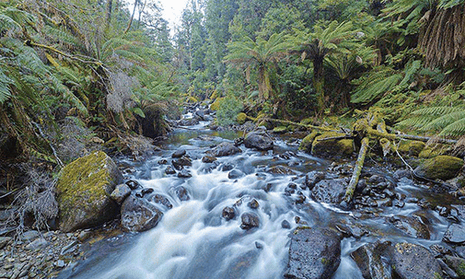The government is being pressed to alter the charitable status of environmental groups after a Liberal MP successfully argued to his party that the groups are not “real charities” like the Red Cross or the Salvation Army.
A motion introduced by MP Andrew Nikolic to the Liberal federal council called for environmental groups to be stripped of charitable rights, such as the ability to receive tax-deductible donations.
Nikolic, the federal member for the Tasmanian electorate of Bass, said the groups should not be subsidised for political activism, some of it which he claimed was illegal. The conference motion passed the motion unanimously.
“Real charities include the Red Cross and the Salvos,” Nikolic told the conference. “Believe it or not, organisations like the Wilderness Society, Australian Conservation Foundation, Bob Brown Foundation and all the environmental defenders offices around Australia are currently recognised as charities as well; the latter provides free legal advice to greens groups.
“The Bob Brown Foundation currently campaigns against the government and is soliciting tax-deductible donations to fund that campaign, while real charities like St Vinnies and Salvos struggle for donors.”
The conference motion states that “eco charities be treated as corporations under consumer and competition law” and “should not be eligible for deductible gift recipient status when advocating political issues”.
Nikolic said green groups had received “substantial government funding”, only to use their tax status to fund “activism which adversely impacts business and communities”.
The MP also called for changes to the secondary boycott laws which would ban campaigns against companies on the grounds they are selling products that damage the environment. In April, Richard Colbeck, parliamentary secretary for agriculture, said there was an “appetite in the government” for removing environmental groups’ exemption from competition laws, which deal with such boycotts.
Nikolic said 13 environment groups were eligible for tax deductible donations, with many abusing this status to appease a “radical and extreme minority”.
"I moved the motion because I think the activities of these groups has been enormously damaging to our state of Tasmania, I think we’ve seen for far too long these groups undertaking activities like boot camps and engaging in political activism, illegal activism,” he said.
"We are a free society, where people can protest and have their say, but too often these groups attract concessions and donations, then engage in illegal activities. It’s just not right.”
The Wilderness Society, one of the groups targeted by Nikolic, said the move was a lurch to the “draconian right”.
Its national director, Lyndon Schneiders, said attempts to stop environmental groups campaigning “against environmentally destructive products and companies” was “illiberal” and “counterproductive”.
“History shows that responding to legitimate community concerns through increasing punitive measures fails and ultimately costs the industry. The spectacular collapse of one-time logging giant Gunns Ltd is testament to that. The coal seam gas industry should also take notice here.
“Liberal governments are re-creating problems by reversing forest protection, abandoning implementation of the Tasmanian forest agreement and taking the state back into conflict.”
Decisions by the Liberal party's federal council are not binding on MPs, but they do carry influence within the parliamentary party.

Comments (…)
Sign in or create your Guardian account to join the discussion